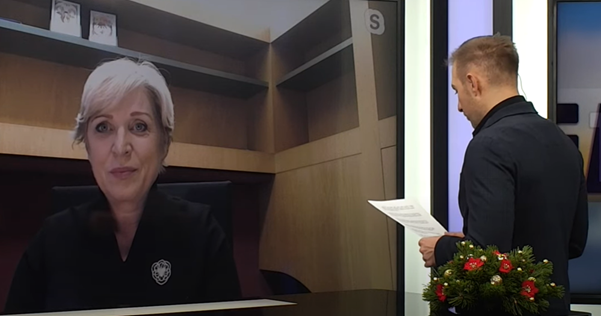On Thursday, the European Parliament will vote on a resolution on the rule of law in Slovenia. MEP Romana Tomc from the Slovenian Democratic Party (SDS) believes that the resolution will be adopted and that this will not come as a surprise. “Of course, we expect the resolution to be adopted, as it enjoys the support of the left-wing part of the European Parliament,” she said. She then went on to point out that the majority in the European Parliament is not even aware of this resolution and does not pay any actual attention to it. According to Tomc, its adoption will have no actual consequences – instead, this matter was yet another attempt by the Slovenian opposition to harm the current Slovenian government.
The last plenary session of the European Parliament began on Monday in Strassbourg, at which a resolution on the rule of law in Slovenia will also be voted on Thursday. In it, if supported, the European Parliament will express great concern over the deep polarisation in the country and call on prominent public figures to engage in a respectful and civilised public debate. The motion for a resolution on Slovenia was proposed by four political groups in the European Parliament: the Social Democrats, the Liberals, the Greens, and the Left. The largest parliament group, the centre-right European People’s Party, the European political family of Slovenia’s current Prime Minister, Janez Janša, did not join the aforementioned groups.
The eighteen-point resolution of the European Parliament, which was also made public late on Friday evening, includes an expression of deep concern over the level of public debate, hostility, mistrust and deep polarisation in Slovenia, which has undermined (or so they say) trust in public authorities – and among them also politics. With the resolution, the European Parliament is supposedly also pointing out that influential political figures and politicians in Slovenia, including members of the government, must set an example and ensure a respectful and civilised public debate, without intimidation, attacks, insults and harassment.
Member of European Parliament Romana Tomc said there would be no more discussions on the resolutions, but it will only be voted on on Thursday. “Of course, we expect the resolution to be adopted, as it enjoys the support of the left-wing part of the European Parliament,” she explained. In this case, this comes as no surprise, but it is also very clear that this resolution was drafted in Slovenia. “It has been unequivocally proven /…/ that there was an attempt by the Slovenian opposition to harm the current Slovenian government through the EU institutions – this time, it was through the European Parliament,” Tomc added.
Only the people who were part of a fact-finding mission to Slovenia know what was happening here
The interference of Tanja Fajon‘s assistant in the resolution was also discussed in the European Parliament, and lots of Tomc’s colleagues expressed disagreement with these actions; however, the whole thing was then “swept under the rug.” “The scandal, which they wanted to revitalise in a way, had somehow subsided,” she said. Sophie in ‘t Veld, the leader of the commission that came to Slovenia, said that Fajon’s assistant going over the report before it was even made public, and even correcting it, was normal and that practically everyone does that. “But it should be noted here that this is not just some document of legislative nature, but a kind of record of what happened on the fact-finding mission to Slovenia. Of course, it is only those who were actually present who can credibly talk about what happened.”
The resolution was initially intended as an attack on the outstanding issues of delegated European prosecutors and the funding of the Slovenian Press Agency. “Both open issues have been resolved, so we are all wondering what the resolution is actually for,” she said. According to Tomc and her colleagues from the EPP, this is more an attack of the left on the right at the European level. “Namely, the less right-wing parties we have in the EU, the better it is for the left in the EU.”
In Slovenia, we have problems with the rule of law
After the mission to Slovenia had ended, Sophie in ‘t Veld said that the institutions in Slovenia work well and that the rule of law is not endangered. “I do not agree with Sophie in ‘t Veld, as I believe that the institutions in Slovenia are not working well and that we have really deep problems with the rule of law,” Tomc explained, adding that those who should work on this topic, have completely neglected it and left it aside. “Now that Sophie in ‘t Veld has returned to Brussels, she has somehow changed her story, forgot about these statements, and made the context much sharper.”
This resolution is one that does not enjoy any support in the European Parliament and is one of the many resolutions they are adopting. And according to Tomc, there will be no consequences if the resolution is adopted. “This is just a document; I see it as some sort of political pamphlet that will receive lots of attention – exclusively from Slovenia,” she said. As her colleagues from the other countries have previously told her, they do not even know why we are actually talking about Slovenia in this case. “However, we are talking a lot about how successfully Slovenia handled its Presidency of the Council of the European Union, and about the successes that the Slovenian Presidency has been experiencing in recent days on a really large scale.”
Sara Rančigaj


